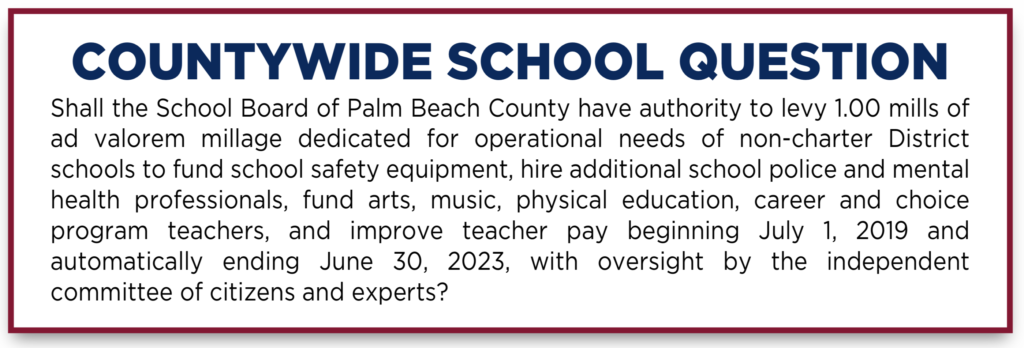Usurping The Will Of the Voters: Florida’s HB7123
Last fall, Palm Beach County voters overwhelming supported (with 72.37% of the vote) a 1.00 ad valorem millage increase in support of funding their public schools. This was the language:

The ballot question clearly states “dedicated for operational needs of non-charter District schools.” More about the PBC Referendum here.
In the recent 2018 Quality Counts survey, Florida ranked 44th in the nation in School Spending. For current 2018-19 school year, state lawmakers only increased basic education funding by $0.47 per student. Average teacher salary is 45th in the nation and average salary for Instructional staff ranks 47th. Districts, denied funding from Tallahassee, asked local voters for support and, all across the state, voters answered “yes.”
Twenty one of Florida’s 67 School Districts went to their voters with local tax and milage referenda. Every single referenda passed, showing the support Floridians have for their local public schools and their public school teachers.
Today, the House Appropriations Committee advanced this year’s proposed tax package, HB7123. The bill was initially introduced as House Ways and Means Proposed Committee Bill, PCB WMC 19-02 on 4/2/19, debated in that committee on 4/11/19 and is now appears headed for the House floor, where it is all but assured to pass along party line votes.
HB7123 includes the traditional Back to School and Disaster Preparedness Sales Tax Holidays, a reduction in the tax rate for commercial property rentals and some changes to the way hospitals qualify for charitable tax exemptions. It also includes what Rep. Joseph Gellar (D-100) described, in today’s Appropriations meeting, as “a poison pill”: language requiring all voter-approved, local school district “discretionary operating property tax levies” be shared proportionately with the charter schools in their district, which would apply to all collections after July 1, 2019. “Whether the voters want it or not,” Rep. Barbara Watson (D-107) clarified.
Yes, whether the voters want it or not… whether the voters voted for it or not.
Rep. Bobby DuBose (D-94) argued the language “contradicts the will of the voter.” The bill’s sponsor, Rep Bryan Avila (R-111) argued the language merely clarified the expectations of the statutes surrounding local school tax referenda, stating “referendums should be written to comply with the intent of the law, not the other way around.” He also insisted that the law wasn’t just written in response the a recent Miami-Dade referendum, though it was “so vague” that he considered it “the most egregious.”
To be clear, regardless of what is happening in Miami-Dade, the voters of Palm Beach expressly DID NOT vote to “share” their referendum money with charters. Their proposal was crystal clear. Yet, come July 1, they will be sharing their property taxes with charters, if (when?) HB7123 passes…
For the record, this is not a charters vs traditional public schools argument. This is a local control issue. Should Tallahassee be allowed to change the way voter-approved, tax payer dollars are spent, retroactively? Rep. Carlos Guillermo Smith (D-49) called it “usurping the will of the voters.” Would Palm Beach County voters have passed the referendum if they had known the funding would be shared with charters? No one will ever know. What we DO know is the language in their tax referendum was crystal clear: the new funds were to be “dedicated for operational needs of non-charter District schools.”
Reps. Gellar and Watson argued there were no misconceptions in Miami-Dade either.
Rep. Gellar said (at 1:16:25): “I think that, at least in our county, this was not sold as something that was going to help charter schools. I saw this in our county, I saw what the debate was, I saw what the public comment was… and this was intended to help traditional public schools. That’s why it passed. So your amendment goes directly against that and your answer to Rep. Diamond’s question is that, whether the voters want it or not, we’re going to impose it on them.”
Rep Watson agreed (at 1:17:40) the proposal was never intended to include charter schools: “There was no misconception. It was clear to our voters what they were actually voting for. It did not give them the illusion that this was going to be spread amongst others. So, I would say to you, let’s respect the voters and their right to make a decision. They were very clear that they wanted to increase teacher salary in our county, so I think we should respect that wish… to circumvent it with this measure, I think, would be a vote against the citizen’s of Miami-Dade County.”
Edu-writer Peter Greene called it “legislative thievery“: “Tallahassee isn’t even trying to be sneaky. The message is clear; they want charter schools to get the money, and public schools to get the shaft.” He described the scenario like this:
Imagine. You live on the 300 block of your city, and your neighborhood is starting to look kind of run down, mostly because the city has redirected a ton of your tax dollars to the neighborhood on the 400 block. You try to fight city hall, but that’s futile, so instead, you get the neighborhood together, and you collect money from amongst yourselves to upgrade sidewalks, clean the streets, refurbish the curbs, and just generally fix the place up. And then the city sends a message– “That money you just collected? You have to give some of it to the neighborhood in the 400 block.
Congratulations. You live in Florida.”
http://curmudgucation.blogspot.com/2019/04/fl-charter-thievery-and-worst.html
Exactly.
Note: During today’s House Appropriations Committee, Chair Avila presented, and passed, an amendment which clarified that charter schools must, at least, use the shared funds “consistent with the purposes of the levy.” The amendment also removed the original bill’s financial penalty for school districts failing to properly share the funds with charters.
